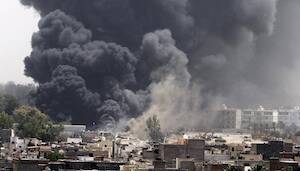As NATO bombs continue to fall over Libya, some challenge the air campaign. A new concept in international relations, “the responsibility to protect,” was a key concern of the U.N. Security Council Resolution authorizing intervention. Gerard Powers, director of Catholic Peacebuilding Studies at the Kroc Institute for International Peace Studies at the University of Notre Dame, said that while the Libyan leader Muammar el-Qaddafi’s threat to civilians forfeited his government’s right “to be protected by norms of sovereignty and nonintervention,” NATO’s dependence on military action poses a moral dilemma. “If the military objective is really regime change, that’s hard to justify in Catholic approaches to humanitarian intervention,” he said. Instead of military intervention, Powers called for nonmilitary steps, including sanctions, political pressure and diplomacy. “In Libya, we have a disconnect between ends and means,” Powers said. “Airstrikes seem to be a tactic impersonating strategy, and without a viable strategy, military might easily masquerades as humanitarianism.”
Libya Strategy Questioned
Show Comments (
)
Comments are automatically closed two weeks after an article's initial publication. See our comments policy for more.
The latest from america
At a Mass for the Jubilee of Youth outside Rome, Pope Leo exhorted over a million young people to be "seeds of hope" and a "sign that a different world is possible."
Perhaps it is the hard-won wisdom that comes with age, but the Catholic rituals and practices I once scorned are the same rituals and practices that now usher me into God's presence, time and time again.
"Only through patient and inclusive dialogue" can "a just and lasting conflict resolution can be achieved" in the long-running conflict between Israelis and Palestinians, said the Holy See's permanent observer to the United Nations.
The ”Bad Guys” films ask, how do we determine who the “bad guys” are? And if you’re marked as “bad” from the start, can you ever make good?








